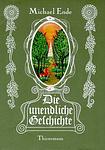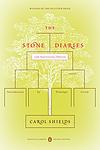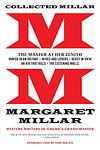The Greatest Canadian, German "Fiction" Books Since 1950
Click to learn how this list is calculated.
This list represents a comprehensive and trusted collection of the greatest books. Developed through a specialized algorithm, it brings together 300 'best of' book lists to form a definitive guide to the world's most acclaimed books. For those interested in how these books are chosen, additional details can be found on the rankings page.
Genres
Countries
Date Range
Reading Statistics
Click the button below to see how many of these books you've read!
Download
If you're interested in downloading this list as a CSV file for use in a spreadsheet application, you can easily do so by clicking the button below. Please note that to ensure a manageable file size and faster download, the CSV will include details for only the first 500 books.
Download-
1. The Handmaid's Tale by Margaret Atwood
Set in a dystopian future, this novel presents a society where women are stripped of their rights and are classified into various roles based on their fertility and societal status. The protagonist is a handmaid, a class of women used solely for their reproductive capabilities by the ruling class. The story is a chilling exploration of the extreme end of misogyny, where women are reduced to their biological functions, and a critique of religious fundamentalism.
-
2. The Tin Drum by Günter Grass
The novel tells the story of Oskar Matzerath, a boy who decides on his third birthday that he will stop growing and remain a three-year-old forever. Oskar is gifted with a tin drum by his mother, which he uses to express his emotions and thoughts. Living in Danzig during the rise of Nazi Germany, Oskar's refusal to grow is a form of protest against the adult world. The book is a blend of magical realism and historical fiction, providing a unique perspective on the horrors of World War II and the post-war era in Germany.
-
3. Neuromancer by William Gibson
In this groundbreaking cyberpunk novel, a washed-up computer hacker is hired by a mysterious employer to pull off the ultimate hack. As he navigates a dystopian future filled with artificial intelligence, corporate espionage, and virtual reality, he must confront his own past and the dark realities of the digital world. The narrative explores themes of technology, identity, and consciousness, pushing the boundaries of science fiction literature.
-
4. Perfume by Patrick Suskind
Set in 18th-century France, this novel tells the story of Jean-Baptiste Grenouille, a man born with an extraordinary sense of smell but no personal scent of his own. He becomes an apprentice to a prominent perfumer and learns to create the world's most intoxicating perfumes. However, his obsession with capturing the perfect scent leads him down a dark path, as he begins to kill young women to extract their scent. The book is a chilling exploration of obsession, identity, and the power of scent.
-
5. Austerlitz by W. G. Sebald
The novel follows the story of Jacques Austerlitz, an architectural historian who was brought to England on a Kindertransport from Czechoslovakia during World War II. As an adult, Jacques embarks on a journey to uncover his past, including his original identity, his parent's fate, and his own lost history. The narrative is a haunting exploration of memory, identity, and the lasting impact of the Holocaust.
-
6. The English Patient by Michael Ondaatje
"The English Patient" is a story of four diverse individuals brought together at an Italian villa during the final days of World War II. The narrative revolves around a severely burned man who can't remember his name or past, a young Canadian nurse who tends to him, a Sikh British Army sapper, and a Canadian thief. As they navigate their own traumas and losses, the past of the mysterious patient slowly unravels, revealing a tale of love, identity, and betrayal.
-
7. The Book Thief by Markus Zusak
Set in Nazi Germany during World War II, the novel follows the story of a young girl who finds solace in stealing books and sharing them with others. In the midst of the horrors of war, she forms a bond with a Jewish man her foster parents are hiding in their basement. The story is narrated by Death, offering a unique perspective on the atrocities and small acts of kindness during this period. The girl's love for books becomes a metaphor for resistance against the oppressive regime.
-
8. Life of Pi by Yann Martel
A young Indian boy named Pi Patel survives a shipwreck and finds himself adrift in the Pacific Ocean on a lifeboat with a Bengal tiger named Richard Parker. Over the course of 227 days, Pi uses his knowledge of animal behavior and survival skills to coexist with the tiger, ultimately leading to an unusual and deeply spiritual journey. The story explores themes of faith, survival, and the interpretation of reality.
-
9. Anniversaries by Uwe Johnson
"Anniversaries" is a novel that provides a detailed account of a year in the life of Gesine Cresspahl, a German immigrant living in New York City with her young daughter. The narrative unfolds through daily entries, spanning from August 1967 to August 1968, intertwining the protagonist's present-day experiences with her traumatic past in Nazi and post-war East Germany. The novel explores themes of memory, identity, displacement, and the complexities of history, offering a nuanced perspective on the immigrant experience and the lasting impacts of historical trauma.
-
10. Selected Stories of Alice Munro by Alice Munro
This collection of short stories offers a comprehensive view of the author's narrative talent, showcasing her ability to create complex characters and situations that reflect the human condition. Set in various locations, from small Canadian towns to exotic foreign locales, each story delves into the intricate relationships, personal struggles, and quiet triumphs of its characters. The author's writing is marked by her keen observation, psychological insight, and the ability to convey the extraordinary within the ordinary, making each story a unique exploration of life's complexities.
-
11. The Reader by Bernhard Schlink
"The Reader" is a poignant narrative centered around a young German boy's complex relationship with an older woman, who later turns out to be a former Auschwitz guard. Their relationship begins with her teaching him to read, but takes a drastic turn when she disappears, only to reemerge on trial for war crimes. The novel explores themes of guilt, shame, and redemption, as the boy, now a law student, grapples with his feelings for a woman he once loved, but whose past actions he cannot reconcile with.
-
12. Obasan by Joy Kogawa
The book is a semi-autobiographical novel that tells the story of a Japanese-Canadian woman named Naomi, who reflects on her experiences during World War II. As a child, Naomi was forced into internment along with thousands of other Japanese-Canadians, following the bombing of Pearl Harbor. The narrative explores the themes of racism, identity, silence, and the power of memory, as Naomi grapples with the trauma of her past and the impact of her cultural heritage on her present life.
-
13. The Blind Assassin by Margaret Atwood
The novel is a complex narrative that weaves together the story of two sisters in early 20th century Canada, one of whom publishes a scandalous novel that leads to her suicide. The surviving sister, now an elderly woman, reflects on their lives, revealing family secrets, heartbreak, and the truth behind the scandalous novel. The narrative is interspersed with excerpts from the controversial book, a science fiction story within a story, adding layers of intrigue and mystery.
-
14. The Neverending Story by Michael Ende
"The Neverending Story" is a captivating fantasy novel that follows the adventures of a young boy named Bastian. When he stumbles upon a mysterious book, he becomes engrossed in the magical world of Fantastica, where he must embark on a perilous quest to save the realm from destruction. As Bastian's imagination intertwines with reality, he discovers the power of storytelling and the importance of believing in oneself. This enchanting tale explores themes of courage, friendship, and the boundless nature of imagination.
-
15. The Rings of Saturn by W. G. Sebald
"The Rings of Saturn" is a richly detailed travelogue that follows the narrator's journey along the coast of Suffolk, England. The narrative weaves together history, literature, and personal anecdotes, exploring topics as diverse as the decline of the herring industry, the horrors of colonialism in the Congo, and the life of philosopher Sir Thomas Browne. The book is characterized by its melancholic tone, its digressive style, and its meditative reflections on memory, time, and decay.
-
16. The Stone Diaries by Carol Shields
The novel follows the life of Daisy Goodwill Flett, a seemingly ordinary woman, from her birth in Canada in 1905 to her death. It explores her experiences as a mother, wife, and widow, as well as her work as a gardener and her later years as a columnist. The book is unique in that it is written in a variety of styles including letters, diary entries, and third-person narrative, and it explores themes of identity, love, and the often overlooked lives of women.
-
17. Beast In View by Margaret Millar
"Beast In View" by Margaret Millar is a gripping psychological thriller that follows the story of Helen Clarvoe, a troubled woman who becomes entangled in a web of deception and manipulation. When Helen receives a series of disturbing phone calls from an unknown caller, she becomes convinced that someone is out to destroy her life. As she desperately tries to uncover the identity of her tormentor, Helen finds herself questioning her own sanity and unraveling dark secrets from her past. With its intricate plot and complex characters, this suspenseful novel explores themes of obsession, betrayal, and the fragile nature of the human mind.
-
18. The Lost Honour of Katharina Blum by Heinrich Böll
"The Lost Honour of Katharina Blum" is a story about a young woman who becomes the target of a media smear campaign after she falls in love with a man who is suspected of being a political radical. The media's relentless invasion of her privacy and the negative portrayal of her character lead to tragic consequences, highlighting the destructive power of sensationalist journalism. The novel is also a critique of the political climate in Germany during the 1970s.
-
19. The Deptford Trilogy by Robertson Davies
"The Deptford Trilogy" is a series of interconnected novels that explore the life of a man from a small Canadian town named Deptford, and the ripple effects of a single childhood event that shaped the lives of three boys. The narrative weaves themes of love, guilt, art, and the complexity of human nature. The story is told from multiple perspectives and spans several decades, providing a deep exploration of the characters' psychological and spiritual development.
-
20. Lives of Girls and Women by Alice Munro
"Lives of Girls and Women" is a coming-of-age story about a young girl growing up in a small town in Canada during the 1940s. The novel explores the protagonist's journey towards self-discovery and understanding of the world around her. The protagonist grapples with societal expectations, familial relationships, and her own burgeoning sexuality, all while navigating the complexities of adolescence and the transition into adulthood. The book offers a profound exploration of the female experience, delving into themes of gender, identity, and the intricate dynamics of human relationships.
-
21. The Emigrants by Winfried Georg Sebald
"The Emigrants" is a novel that explores the experiences and memories of four different emigrants, each with a unique and complex history. The narrative primarily focuses on the psychological impact of displacement and the haunting nature of the past. The author delves deep into their lives, revealing their struggles with identity, loss, and the persistent influence of their roots. The narrative is interwoven with historical events, photographs, and other documents, creating a rich tapestry that blurs the line between fact and fiction.
-
22. A Legacy by Sybille Bedford
"A Legacy" is a historical novel that captures the social and political turmoil of early 20th century Germany through the eyes of its protagonist. The story follows a young woman who hails from two distinct families, one being a wealthy Jewish family from Berlin and the other, an aristocratic Catholic family from rural Germany. The narrative provides a detailed account of the protagonist's life, her family's eccentricities, and the eventual downfall of her families amidst the backdrop of the First World War and the Weimar Republic.
-
23. The German Lesson by Siegfried Lenz
"The German Lesson" is a vivid exploration of the moral and cultural conflicts of World War II, set in a small German village. The story is narrated by a young boy who is tasked by his school teacher with an assignment to write an essay on "The Joys of Duty." As his father, a local police officer, is assigned the duty of preventing a popular local artist from painting, the boy finds himself torn between his father's rigid adherence to duty and his own growing appreciation for art and individual expression. The narrative grapples with themes of duty, obedience, and the power of art, providing a thoughtful examination of life under the Nazi regime.
-
24. Cat's Eye by Margaret Atwood
This novel revolves around the life of a controversial painter, Elaine Risley, who returns to her hometown, Toronto, for a retrospective of her art. Haunted by her past, she reminisces about her childhood and the complex relationships she had, especially with her best friend Cordelia. The story delves into themes of memory, identity, and the often painful experiences of childhood and adolescence. The protagonist's journey is one of self-discovery, as she navigates through the complexities of female friendship, bullying, and the struggle to fit in.
-
25. Fugitive Pieces by Anne Michaels
"Fugitive Pieces" is a novel that explores the life of a Holocaust survivor who is rescued as a young boy by a Greek geologist. The boy grows up to become a poet and translator, haunted by his traumatic past and the loss of his family. The story also includes the perspective of a young professor who is obsessed with the poet's work, digging into the poet's past to understand his own life. The novel delves into themes of memory, loss, and the power of language.
Reading Statistics
Click the button below to see how many of these books you've read!
Download
If you're interested in downloading this list as a CSV file for use in a spreadsheet application, you can easily do so by clicking the button below. Please note that to ensure a manageable file size and faster download, the CSV will include details for only the first 500 books.
Download























